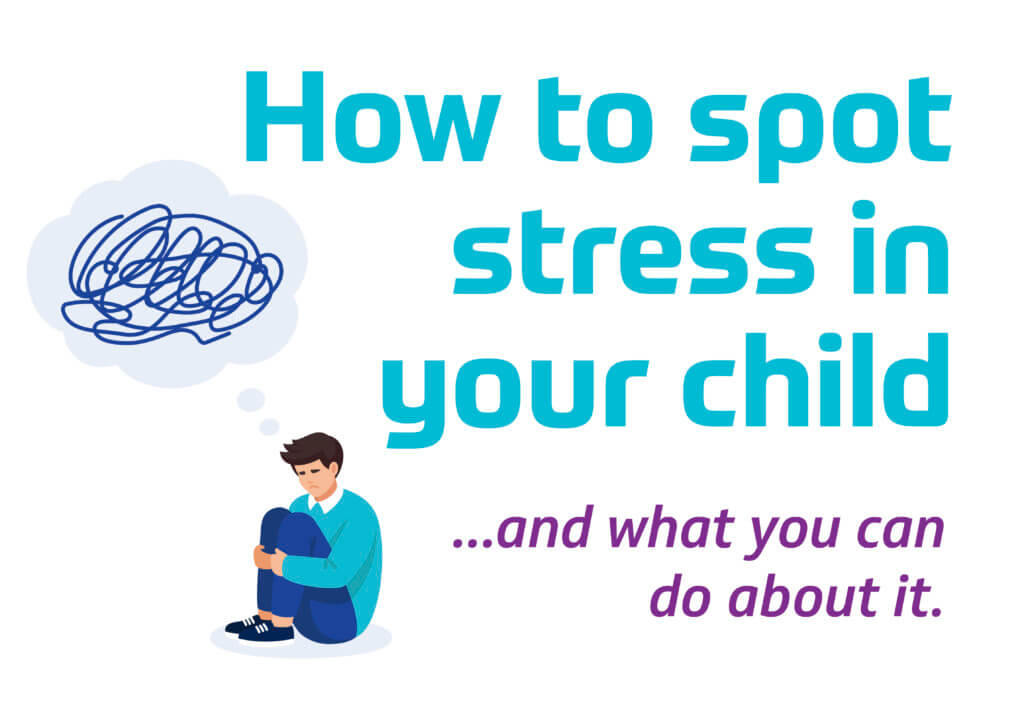How to Spot Stress in Your Child…and What to Do About It

Stress in Children
As the world changes and technology grows, there’s no shortage of stressors for children. From learning about major world events to online bullying, you can take your pick about what might impact your kids on a daily basis. Many kids have the ability to brush off problems and focus on the task ahead—but how do you know if your child is dealing well with major stress issues?
Stress for children is shown in two major ways—Emotionally and/or physically.
Emotional Manifestations of Stress
Emotional manifestations of stress routinely include:
- Nightmares
- Dramatic mood changes
- General anxiety
Physical Manifestations of Stress
Physical manifestations of stress include:
- Vomiting
- Headaches
- Abdominal pain
- Bedwetting (in potty-trained children)
- Chest pains
Some of these physical symptoms could be attributed to other issues, but the major difference and indicator that stress is to blame is when patterns start to arise for these symptoms around a certain stressor or trigger.
Example: Abdominal Pain
Your child may complain of abdominal pain every day, and you may notice it when they talk about math class or have it right before school. Then, on the weekends or summer, they don’t have abdominal pain. They could have something physically wrong with them, but it could also be a manifestation of stress.
How Do I Pinpoint My Child’s Stressor(s)?
You may recognize the signs and symptoms, but how can you figure out exactly the cause?
Unplugged Time
It can be as simple as spending a little “unplugged” quality time with them. By staying in tune with your children, conversation becomes more casual and it’s easier for them to open up with you. When your child needs help, it’s vital there’s an open dialogue for them to lean into.
Taking time in your daily routine to spend quality time with your kids is key to building intentional conversations and appropriate coping mechanisms. Growing up is hard enough; kids need a support system to work through life lessons.
Spending time having conversations with your child doesn’t have to be the same pace you keep with your peers—it can be more casual and focused. Creating a habit takes time, but it’s worth it for the conversations and relationship you’re building.
Create a Safe Space for Your Child
Small ways to create a safe space for your child to share:
- Take evening walks with your kids (studies show it’s good for you too!)
- Make game night a normal part of the schedule
- Create chores that you do together, like cooking dinner or folding laundry
- Read before bedtime
- Find a fun game/trivia podcast to do together in the car (Reader’s Digest has a great list!)
Great conversation starters:
- “What was your favorite class today?”
- “How’s your friend, ____, doing? I know they were feeling crummy last week!”
- “What do you want to learn how to do?”
- “Can you tell me your favorite things about your best friend?”
- “What’s your best knock knock joke?”
How to Cope With Stress
So, you recognized it, identified its source… now what?
If you and your child are still struggling to cope with stress, you may just need a few new tools in your toolbox. Consider taking a multi-pronged approach to help your child handle their stress.
Counseling
Seeing a family or pediatric therapist can be highly beneficial for a child in managing stress. Some ways that they can help include:
- Understand and identify their emotions
- Develop coping strategies
- Improve communication skills
- Build resilience
- Improve family dynamics
- Teach behavioral techniques
- Provide support
Physical Exercise
Encourage your child to participate in regular physical activity, whether through sports, dance, outdoor play, or structured routines. Physical activity not only provides children a distraction from their stressors, it also helps them manage their stress through:
- Release of endorphins
- Improved sleep
- Social interaction
- Routine and structure
- Establishing healthy habits
Medication
When you add medication to stress reduction techniques like counseling and physical exercise, you may see dramatic differences in your child. Do not consider it a failure as a parent.
Just like adults, each person handles stress differently and needs the best solution for their disposition. Start the conversation with your child’s pediatrician. He or she can often point you in the right direction.
Make an Appointment With Singing River Pediatrics
With an attentive ear and a desire to help, you’re already leaps and bounds ahead. And remember to be kind to yourself as you navigate stress with your children. The best place to start relieving stress in any situation is with yourself–your children will notice and follow suit.

Still needing help addressing stress in your children? Make an appointment at Singing River Pediatrics.
Our pediatricians are located at our three clinics in Gulfport, Ocean Springs, and Pascagoula as well as Singing River Medical Clinic in Hurley. Make a first appointment for your child by calling the clinic of your choice.



